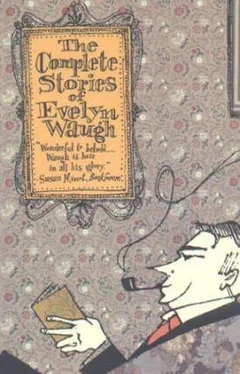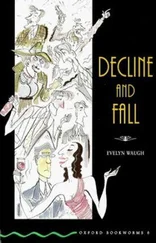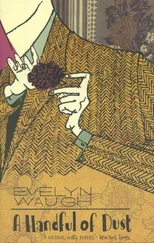Evelyn Waugh - The Complete Stories Of Evelyn Waugh
Здесь есть возможность читать онлайн «Evelyn Waugh - The Complete Stories Of Evelyn Waugh» весь текст электронной книги совершенно бесплатно (целиком полную версию без сокращений). В некоторых случаях можно слушать аудио, скачать через торрент в формате fb2 и присутствует краткое содержание. Год выпуска: 1998, ISBN: 1998, Жанр: Классическая проза, на английском языке. Описание произведения, (предисловие) а так же отзывы посетителей доступны на портале библиотеки ЛибКат.
- Название:The Complete Stories Of Evelyn Waugh
- Автор:
- Жанр:
- Год:1998
- ISBN:0-316-92546-2
- Рейтинг книги:3 / 5. Голосов: 1
-
Избранное:Добавить в избранное
- Отзывы:
-
Ваша оценка:
- 60
- 1
- 2
- 3
- 4
- 5
The Complete Stories Of Evelyn Waugh: краткое содержание, описание и аннотация
Предлагаем к чтению аннотацию, описание, краткое содержание или предисловие (зависит от того, что написал сам автор книги «The Complete Stories Of Evelyn Waugh»). Если вы не нашли необходимую информацию о книге — напишите в комментариях, мы постараемся отыскать её.
The Complete Stories Of Evelyn Waugh — читать онлайн бесплатно полную книгу (весь текст) целиком
Ниже представлен текст книги, разбитый по страницам. Система сохранения места последней прочитанной страницы, позволяет с удобством читать онлайн бесплатно книгу «The Complete Stories Of Evelyn Waugh», без необходимости каждый раз заново искать на чём Вы остановились. Поставьте закладку, и сможете в любой момент перейти на страницу, на которой закончили чтение.
Интервал:
Закладка:
At eight o’clock that evening a weary figure trudged into the gas-lit parlour of the Royal George Hotel, Chagford. He wore sodden riding boots and torn and muddy clothes. He had wandered for five hours over the moor, and was hungry. They provided him with Canadian cheese, margarine, tinned salmon, and bottled stout, and sent him to sleep in a large brass bedstead which creaked as he moved. But he slept until half past ten next morning.
The third day of the honeymoon started more propitiously. A bleak sun was shining a little. Stiff and sore in every muscle, Tom dressed in the still damp riding clothes of his unknown host and made inquiries about reaching the remote village where his Aunt Martha’s house stood, and where Angela must be anxiously awaiting him. He wired to her: “Arriving this evening. Will explain. All love,” and then inquired about trains. There was one train in the day which left early in the afternoon and, after three changes, brought him to a neighbouring station late that evening. Here he suffered another check. There was no car to be hired in the village. His aunt’s house was eight miles away. The telephone did not function after seven o’clock. The day’s journey in damp clothes had set him shivering and sneezing. He was clearly in for a bad cold. The prospect of eight miles’ walk in the dark was unthinkable. He spent the night at the inn.
The fourth day dawned to find Tom speechless and nearly deaf. In this condition the car came to conduct him to the house so kindly lent for his week’s honeymoon. Here he was greeted with the news that Angela had left early that morning.
“Mrs. Watch received a telegram, sir, saying that you had met with an accident hunting. She was very put out as she had asked several friends to luncheon.”
“But where has she gone?”
“The address was on the telegram, sir. It was the same address as your first telegram… No, sir, the telegram has not been preserved.”
So Angela had gone to his host near Exeter; well, she could jolly well look after herself. Tom felt far too ill to worry. He went straight to bed.
The fifth day passed in a stupor of misery. Tom lay in bed listlessly turning the pages of such books as his aunt had collected in her fifty years of vigorous out-of-door life. On the sixth day conscience began to disturb him. Perhaps he ought to do something about Angela. It was then the butler suggested that the name in the inside pocket of the hunting coat would probably be that of Tom’s late, Angela’s present host. Some work with a local directory settled the matter. He sent a telegram.
“Are you all right? Awaiting you here. Tom,” and received the answer:
“Quite all right. Your friend divine. Why not join us here. Angela.”
“In bed severe cold. Tom.”
“So sorry darling. Will see you in London or shall I join you. Hardly worth it is it. Angela.”
“Will see you London. Tom.”
Of course Angela and he knew each other very well…
Two days later they met in the little flat which Mrs. Watch had been decorating for them.
“I hope you’ve brought all the luggage.”
“Yes, darling. What fun to be home!”
“Office tomorrow.”
“Yes, and I’ve got hundreds of people to ring up. I haven’t thanked them for the last batch of presents yet.”
“Have a good time?”
“Not bad. How’s your cold?”
“Better. What are we doing tonight?”
“I promised to go and see mama. Then I said I would dine with your Devon friend. He came up with me to see about some cow-cake. It seemed only decent to take him out after staying with him.”
“Quite right. But I think I won’t come.”
“No, I shouldn’t. I shall have heaps to tell her that would bore you.”
That evening Mrs. Trench-Troubridge said: “I thought Angela was looking sweet tonight. The honeymoon’s done her good. So sensible of Tom not to take her on some exhausting trip on the Continent. You can see she’s come back quite rested. And the honeymoon is so often such a difficult time particularly after all the rush of the wedding.”
“What’s this about their taking a cottage in Devon?” asked her husband.
“Not taking dear, it’s being given them. Near the house of a bachelor friend of Tom’s apparently. Angela said it would be such a good place for her to go sometimes when she wanted a change. They can never get a proper holiday because of Tom’s work.”
“Very sensible, very sensible indeed,” said Mr. Trench-Troubridge, lapsing into a light doze, as was usual with him at nine in the evening.
TOO MUCH TOLERANCE
A round, amiable face, reddened rather than browned by the tropical sun; round, rather puzzled grey eyes; close-cut sandy hair; a large, smiling mouth; a small sandy moustache; clean white duck suit and sun helmet—a typical English commercial agent stopping between ships at a stifling little port on the Red Sea.
We were the only Europeans in the hotel. The boat for which we were both waiting was two days late. We spent all our time together.
We went round the native bazaar and played interminable games of poker dice at the café tables. In these circumstances a casual acquaintance easily assumes a confidential tone.
At first naturally enough we talked of general subjects—local conditions and race problems.
“Can’t understand what all the trouble’s about. They’re all jolly chaps when you get to know them.” British officials, traders, Arabs, natives, Indian settlers—they were all to my new friend jolly good chaps.
Such an odd thing they couldn’t get on better. Of course, different races had different ideas—some didn’t wash, some had queer ideas about honesty, some got out of hand at times when they’d had too much to drink.
“Still,” he said, “that’s nobody’s business but their own. If only they’d all let each other alone to go their own ways there wouldn’t be any problems. As for religions, well, there was a lot of good in them all—Hindu, Mahommedan, Pagan: the missionaries did a lot of good, too—Wesleyan, Catholic, Church of England, all jolly good fellows.”
People in remote parts of the world tend to have unshakable views on every topic. After a few months spent among them it was a relief to come across so tolerant and broad a mind.
On the first evening I left my companion with a feeling of warm respect. Here at last, in a continent peopled almost exclusively by fanatics of one kind or another, I thought I had found a nice man.
Next day we got on to more intimate subjects and I began to learn something of his life. He was now nearer fifty than forty years of age, though I should have thought him younger.
He had been an only son, brought up in an English provincial town in a household where rigid principles of Victorian decorum dominated its members.
He had been born late in his parents’ life, and all his memories dated from after his father’s retirement from a responsible Government post in India.
It was alien to his nature to admit the existence of discomfort or disagreement, but it was clear from his every reference to it that his home had not been a congenial one.
Exact rules of morals and etiquette, ruthless criticism of neighbours, an insurmountable class barrier raised against all who were considered socially inferior, hostile disapproval of superiors—these were clearly the code of my friend’s parents, and he had grown up with a deep-rooted resolution to model his own life on opposite principles.
I had been surprised on the evening of our first meeting to discover the nature of his work. He was engaged in selling sewing machines on commission to Indian storekeepers up and down the East African coast.
Читать дальшеИнтервал:
Закладка:
Похожие книги на «The Complete Stories Of Evelyn Waugh»
Представляем Вашему вниманию похожие книги на «The Complete Stories Of Evelyn Waugh» списком для выбора. Мы отобрали схожую по названию и смыслу литературу в надежде предоставить читателям больше вариантов отыскать новые, интересные, ещё непрочитанные произведения.
Обсуждение, отзывы о книге «The Complete Stories Of Evelyn Waugh» и просто собственные мнения читателей. Оставьте ваши комментарии, напишите, что Вы думаете о произведении, его смысле или главных героях. Укажите что конкретно понравилось, а что нет, и почему Вы так считаете.












